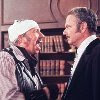
*
*
*
*
*
*
Here comes (American) baseball's All-Star game, and here's a collection of baseball poetry:
Line Drives: 100 Contemporary Baseball Poems, edited by Brooke Howath, Tim Wales, and Elinor Nauen.
It would be interesting (to me) to see poems about soccer (a.k.a. football), cricket, hockey, fencing, etc., from other cultures.
I thought I'd posted "Sestina: The Game of Baseball" before, but I guess not. I embarked on writing the poem because I thought the repetition and figurative circularity of the sestina-form might go well with baseball, a highly ritualized sport. Anyway, here it is:
Sestina: The Game of BaseballThe circle is the center of the game:
The trip from home to home; mound; ball.
And Baseball’s creed is O-penness: fields;
Gloves like birds’ mouths; past fences lies forever.
The game plays out in formulae of three.
Combinations interlock like rings.
Grave umpires speak in prophecy that rings
Out in the voice of Moses. Out, Strike, Ball
Mean really Shame, Yes, No! The game
Is subtle, though, like its faintly sloping fields.
And indefinite: A game can last forever
In theory, infinitely tied at 3 to 3.
Though rules say nine may play, it’s often three
Who improvise a play within the game.
(Tinkers, Evers, Chance) . Pitcher lends ball
To air. Potentiality of bat rings
With power in that instance. All fields
Beckon to innocence and hope forever.
One chance at a time drops from forever.
Player with a caged face grabs for ball.
But batter knocks ball back into the ring
Of readiness, at which point one of three
Things happen that can happen in the game:
Safe or Out or Ball-Beyond-All-Fields:
Home run. Inspire the ball past finite fields,
And you voyage honored on the sea that rings
The inner island. Sail home, touch three
White islands, Hero. Gamers since forever
Have tried to sail past limits of the game,
Shed physics’ laws, hold Knowledge like a ball.
To know this game you have to know the ball,
An atom when contrasted with green fields—
Less than orange, white with pinched rings
Of stitches ridged for grip. With ball come three
Essential tasks: throw, catch, bat. These are forever
Of the Circle in the Center of the Game.
Dropped in the fluid game, the solid ball
Starts widening rings of chance, concentric threes
That open out into the Field. Baseball. Forever.
Copyright 2009 Hans Ostrom








